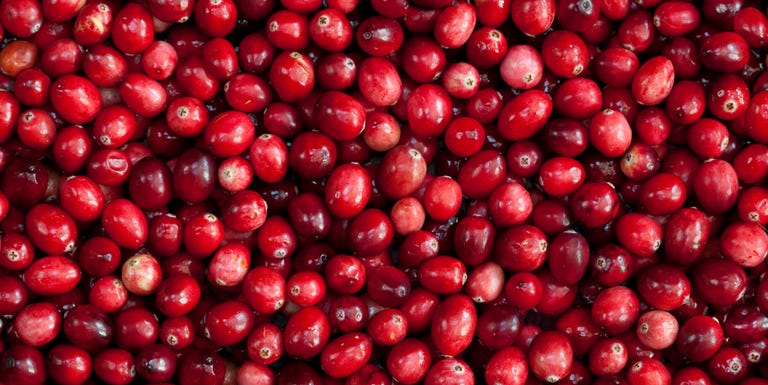Cranberries Are Legit Good For You, But They Still Won’t Cure Your UTIs

I’m just going to say it right now: Cranberries (and cranberry juice) will not cure your urinary tract infection. Or prevent you from getting one. Don’t shoot the messenger!
But just because cranberries’ all-powerful UTI benefits have largely been debunked doesn’t mean that the fall fruit is totally worthless, nutrition-wise. There are actually a lot of cranberry health benefits that have noting to do with painful peeing, says Amy Gorin, R.D.N., owner of Amy Gorin Nutrition in the New York City area.
1. Their high fiber count could help you lose weight
“One cup of whole cranberries contains 16 percent of the recommended daily amount of fiber (about four grams),” says Stephanie Middleberg, R.D., author of The Big Book Of Organic Baby Food: Baby Purees, Finger Foods, and Toddler Meals For Every Stage.
That fiber will help you stay fuller for longer, and prevent big swings in your blood sugar—which in turn could help prevent overeating. Plus, fiber generally keeps things ~moving~ through your digestive tract, which will help prevent bloating (or, worse, constipation).
FYI: You’ll only get fiber from the whole berry—not from cranberry juice.
2. Cranberries help promote a healthy digestive system
Yet another cranberry benefit: The fiber it contains is a type of prebiotic, a nutrient that feeds your gut bacteria and helps them thrive. A 2018 review in Current Developments in Nutrition found that prebiotic fiber has significant positive effects on digestive health.
3. Cranberries may help control your blood sugar
Cranberries on their own are one of the lowest-sugar fruits, with only four grams per cup of whole berries, says Middleberg. Combine that with the high fiber count, and you have a fruit that won’t cause a sugar high. (Cranberry juice and dried cranberries, however, are almost always sweetened, so beware.)

On top of that, cranberries might actually help control your blood sugar. “Cranberries offer the mineral manganese, which helps control blood sugar levels,” says Gorin. A small 2012 study in the Journal of Research in Medical Science found that one cup of cranberry juice daily helped regulate blood sugar in type 2 diabetic male patients. However, more research is needed to show whether cranberries have the same effect on healthy populations and women.
4. Cranberries might help ward off colds
When you’re sick of mainlining oranges (or Emergen-C) during cold season, reach for some cranberries—one cup has about 19 percent of your daily recommended intake of vitamin C. “Vitamin C is important for immune health and may also reduce duration of the common cold,” says Gorin.
5. Cranberries are packed with cancer-fighting antioxidants
“Cranberries contain polyphenolics and isoprenoids, both of which may contribute to cancer prevention,” says Gorin. “Preliminary research has shown that cranberry consumption in relation to breast cancer, colon cancer, and ovarian cancer may be beneficial.”
6. Cranberries can help lower your cholesterol
“Cranberries are rich in anthocyanins (an antioxidant), which give cranberries their color and have protective cardiovascular effects [including] lowering cholesterol,” says Middleberg. They also contain the antioxidant proanthocyanins, which have major anti-inflammatory effects and can protect your blood vessels.

7. Cranberries fight gum disease (but there’s a catch)
The health benefits of cranberries even extend to your mouth, since the fruit can help prevent gum disease, according to Gorin. This is because certain compounds in cranberries prevent bacteria from sticking to surfaces, like teeth and gums, thus reducing chance of infection.
This was backed by a 2008 review and a 2010 review, although the latter warns that consuming cranberry juice with added sugar will basically negate these benefits.
The bottom line: Cranberries have plenty of health benefits—most of which you can get by eating them in their whole, unsweetened form. So….let’s just all cool it on the vodka and cranberry drinks.
Source: Read Full Article


